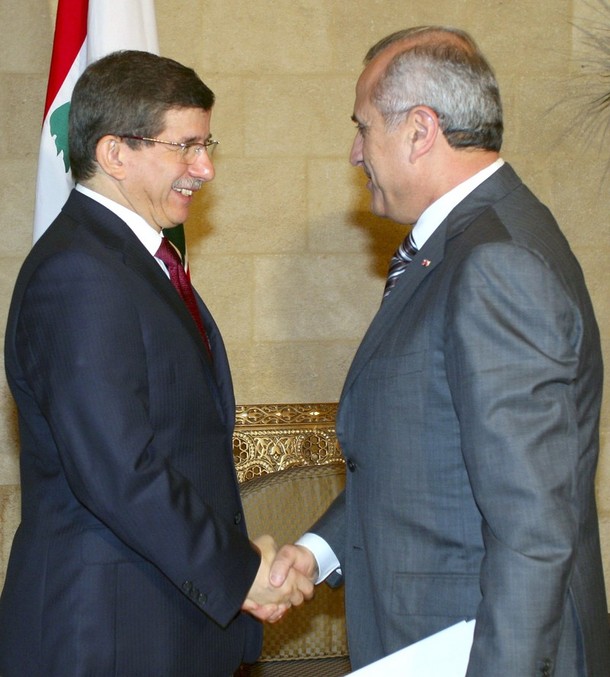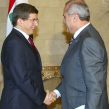
Davutoglu Promotes Stability in Lebanon
Publication: Eurasia Daily Monitor Volume: 6 Issue: 149
By:

On July 30-31, Foreign Minister Ahmet Davutoglu visited Lebanon, where he met the country’s leading politicians, and visited the Turkish contingent serving as part of the U.N. Interim Force in Lebanon (UNIFIL) and the local Turkish-speaking communities. Davutoglu’s agenda highlighted the contours of his new diplomacy, which utilizes Turkish cultural identity and seeks to reconnect with the "external Turks."
Before his departure for Lebanon, Davutoglu stated that the main purpose of his trip was to make a contribution to the stalled efforts to form a coalition government, by drawing on the close contacts Turkey enjoys with all political groups (Cihan, July 30).
Ankara has proven eager to facilitate talks on a coalition government between the two blocs led by the prime minister designate, Saad Hariri, and an opposing group including Hezbollah. In addition to the disagreements between the two groups over a power-sharing arrangement, the meddling of other regional states prevented the formation of a government since the elections in June. Ahead of Davutoglu’s visit, it was announced that the parties had agreed on a government arrangement including the distribution of seats and would work out the technical details and distribution of portfolios (Daily Star, July 30).
Davutoglu held talks with the Lebanese president, prime minister and other officials as well as the representatives of political parties. Afterwards he highlighted Lebanon’s key role in promoting regional stability, and Turkey’s deep interest in regional peace. He expressed his satisfaction with the "positive progress" achieved in coalition talks. "We support all efforts and plans that could bring peace to the region," Davutoglu added (Anadolu Ajansi, July 31).
As part of its policy of creating a peaceful neighborhood, the Turkish government has become actively involved in the resolution of regional issues. In those endeavors, the "cultural identity" of the governing Justice and Development Party has been an important asset, helping it connect with regional leaders. Already during his tenure as the chief foreign advisor to the prime minister, Davutoglu visited the region in order to facilitate talks between various groups and governments, and established an extensive network of personal and professional contacts. In Lebanon, he can claim credit for being able to talk to all groups, including the pro-Western factions and the Iranian-backed Hezbollah.
More importantly, Davutoglu possesses an asset, perhaps unlike any previous Turkish foreign minister: he can connect with his counterparts and the people of the region by speaking their shared cultural language. One journalist accompanying him, Abdulhamit Bilici, noted: "At times [Davutoglu], when speaking to Lebanese leaders, explains a situation to them through using verses from the holy Quran as well as the Hadith. When necessary he recalls moments in Islamic history, in which his addressees are well versed" (Today’s Zaman, August 1).
However, it remains to be seen as to whether this will assist in Ankara’s efforts to resolve the perennial conflicts in the region, where many other mediation efforts have failed. The trip also revealed another element in Davutoglu’s recent diplomacy: in his trips abroad, Davutoglu has visited Ottoman-Turkish cultural sites, and met the Turkish-speaking communities in an effort to reconnect with the once-forgotten "external Turks."
For instance, during his recent trip to Serbia and Montenegro, Davutoglu visited the Sandzak, a region populated by Bosnians, Serbians, Montenegrins and other groups, including Turks. Davutoglu was the first Turkish minister to visit the region after the Ottoman Empire lost it in 1912. He received a very warm welcome in the city of Novi Pazar, and sought to mediate a feud between two local Bosnian politicians who had not talked to each other for several years. Similarly, he attempted to bridge differences between two muftis (religious leaders), by attending Friday prayers in two different mosques (Milliyet, July 26).
In Lebanon, Davutoglu visited a centuries-old Mevlevi lodge, currently undergoing restoration at Ankara’s expense, and attended a performance by whirling dervishes. He also visited a Turkmen village near Tripoli which was practically unheard of in Turkey, where he was welcomed cheerfully by the villagers. In another village he attended the opening ceremony of a Turkish-built hospital with a capacity to serve as many as 20,000 patients annually (Radikal, August 1).
Such policies aimed at reaching out to those communities resonate well with Turkey’s policy of regaining political influence in areas once controlled by various Turkish states in Eurasia, as they can act as important bridges between Turkey and the host countries. However, in some cases, these communities are small and exert no sizeable influence in the national politics of the host nation. Therefore, these efforts play a largely symbolic role: they serve to identify with Turkey’s cultural hinterland, which is one of the pillars of Davutoglu’s foreign policy thinking.
The Turkish-speaking communities living beyond the borders of modern Turkey were practically forgotten. With the dissolution of the Soviet Union, Anatolian Turks rediscovered their brethren in Eurasia, which led to closer ties between Ankara and the new nations in the post-Soviet space. Davutoglu appears determined to fulfill a "historic responsibility" by reconnecting to these smaller communities. Toward this end, Ankara increased the funds of the Turkish Cooperation and Development Agency (TIKA), originally established in 1992 to coordinate Turkish aid programs in Eurasia, and expanded its geographical coverage. Turkey has initiated several projects to build schools, hospitals and other infrastructure serving the Turkish and host communities, which has served as an important diplomatic tool (www.tika.gov.tr).
While "external Turks" make a positive contribution to Turkey’s foreign policy, however, they might also become a liability depending on the development of relations between the host nations and the Turkish communities. Although President Abdullah Gul’s visit to Xinjiang during his China trip was greeted positively, it did not prevent the ensuing developments in the region, when China’s violent repression of ethnic violence damaged Ankara’s diplomatic and trade relations with Beijing (EDM, July 8, 15).




